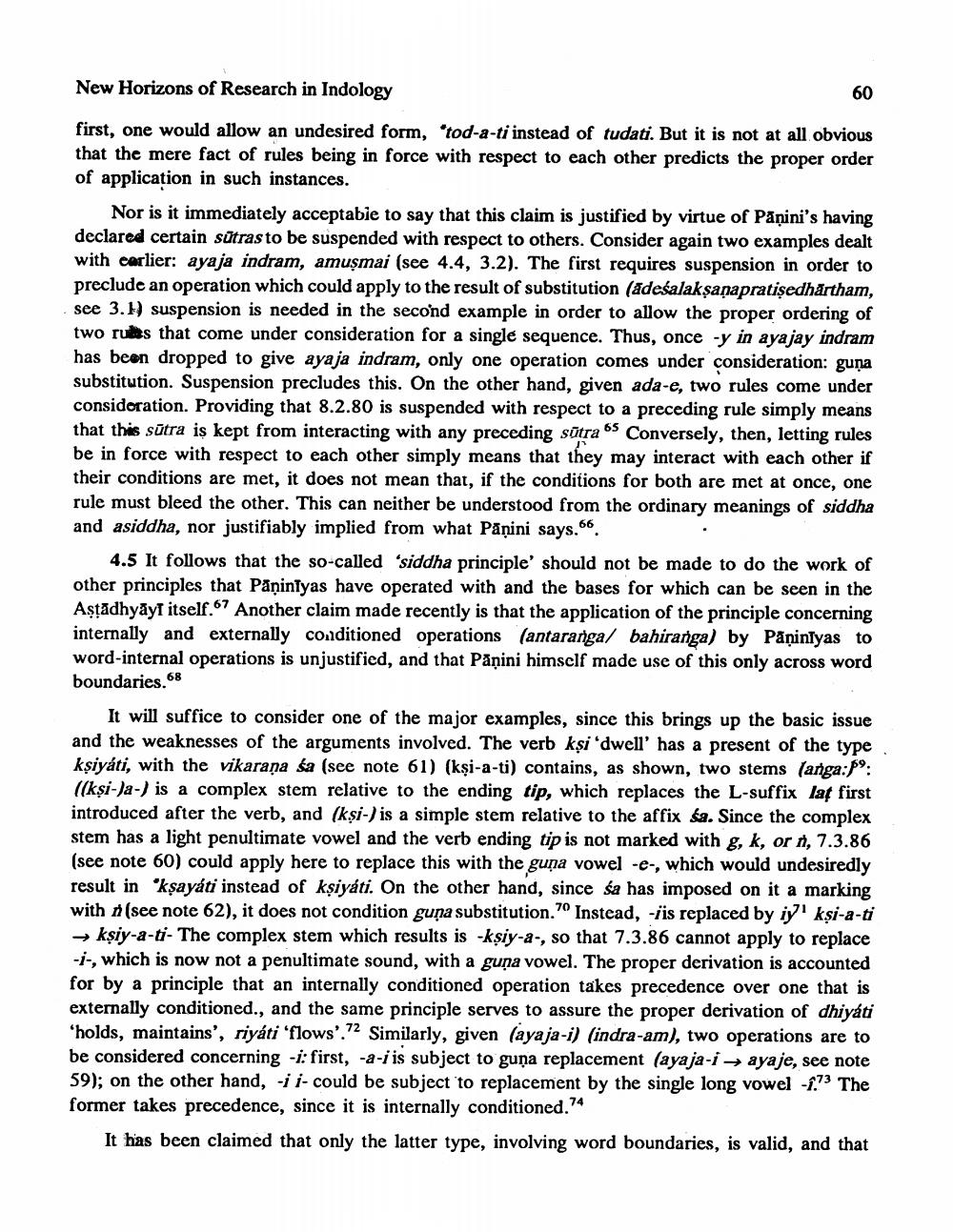________________
New Horizons of Research in Indology
first, one would allow an undesired form, "tod-a-ti instead of tudati. But it is not at all obvious that the mere fact of rules being in force with respect to each other predicts the proper order of application in such instances.
Nor is it immediately acceptable to say that this claim is justified by virtue of Pāņini's having declared certain sūtras to be suspended with respect to others. Consider again two examples dealt with earlier: ayaja indram, amuşmai (see 4.4, 3.2). The first requires suspension in order to preclude an operation which could apply to the result of substitution (adeśalaksanapratişedhartham, see 3.1) suspension is needed in the second example in order to allow the proper ordering of two rules that come under consideration for a single sequence. Thus, once -y in ayajay indram has been dropped to give ayaja indram, only one operation comes under consideration: guna substitution. Suspension precludes this. On the other hand, given ada-e, two rules come under consideration. Providing that 8.2.80 is suspended with respect to a preceding rule simply means that this sūtra is kept from interacting with any preceding sūtra “s Conversely, then, letting rules be in force with respect to each other simply means that they may interact with each other if their conditions are met, it does not mean that, if the conditions for both are met at once, one rule must bleed the other. This can neither be understood from the ordinary meanings of siddha and asiddha, nor justifiably implied from what Pāṇini says.66.
4.5 It follows that the so-called 'siddha principle' should not be made to do the work of other principles that Pāṇiniyas have operated with and the bases for which can be seen in the Astadhyayt itself.67 Another claim made recently is that the application of the principle concerning internally and externally conditioned operations (antarangal bahiranga) by Paņiniyas to word-internal operations is unjustified, and that Pāņini himself made use of this only across word boundaries.68
It will suffice to consider one of the major examples, since this brings up the basic issue and the weaknesses of the arguments involved. The verb kşi'dwell' has a present of the type kşiyati, with the vikarana sa (see note 61) (kşi-a-ti) contains, as shown, two stems (anga:po: ((kși-)a-) is a complex stem relative to the ending tip, which replaces the L-suffix lat first introduced after the verb, and (kşi-) is a simple stem relative to the affix sa. Since the complex stem has a light penultimate vowel and the verb ending tip is not marked with g, k, or n, 7.3.86 (see note 60) could apply here to replace this with the guņa vowel -e-, which would undesiredly result in 'kṣayati instead of kşiyati. On the other hand, since śa has imposed on it a marking with i(see note 62), it does not condition guna substitution. Instead, -sis replaced by iy kși-a-ti
→ kşiy-a-ti- The complex stem which results is -kşiy-a-, so that 7.3.86 cannot apply to replace -i-, which is now not a penultimate sound, with a guna vowel. The proper derivation is accounted for by a principle that an internally conditioned operation takes precedence over one that is externally conditioned., and the same principle serves to assure the proper derivation of dhiyati 'holds, maintains', riyati 'flows'.72 Similarly, given (ayaja-i) (indra-am), two operations are to be considered concerning -i: first, -a-i is subject to guņa replacement (ayaja-i ayaje, see note 59); on the other hand, -i i-could be subject to replacement by the single long vowel -1.The former takes precedence, since it is internally conditioned. 74
It has been claimed that only the latter type, involving word boundaries, is valid, and that




